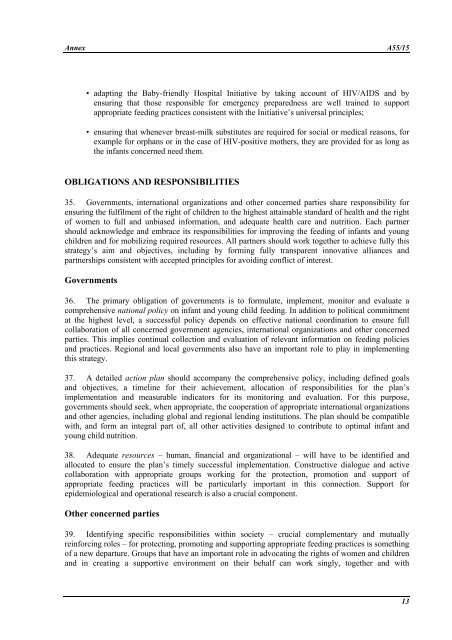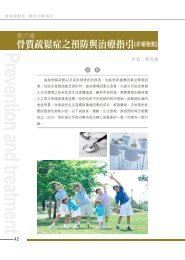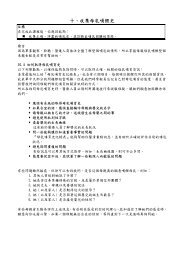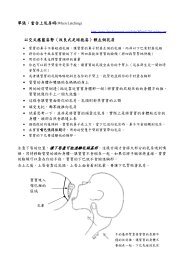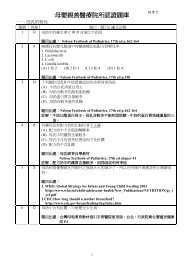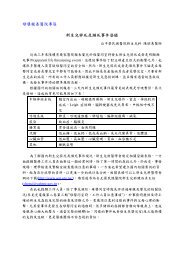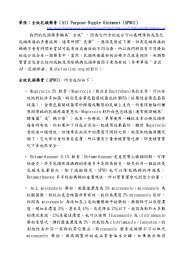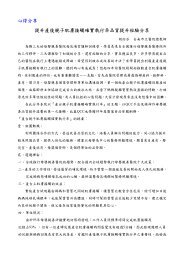WORLD HEALTH ORGANIZATION Infant and young child nutrition
WORLD HEALTH ORGANIZATION Infant and young child nutrition
WORLD HEALTH ORGANIZATION Infant and young child nutrition
Create successful ePaper yourself
Turn your PDF publications into a flip-book with our unique Google optimized e-Paper software.
Annex A55/15• adapting the Baby-friendly Hospital Initiative by taking account of HIV/AIDS <strong>and</strong> byensuring that those responsible for emergency preparedness are well trained to supportappropriate feeding practices consistent with the Initiative’s universal principles;• ensuring that whenever breast-milk substitutes are required for social or medical reasons, forexample for orphans or in the case of HIV-positive mothers, they are provided for as long asthe infants concerned need them.OBLIGATIONS AND RESPONSIBILITIES35. Governments, international organizations <strong>and</strong> other concerned parties share responsibility forensuring the fulfilment of the right of <strong>child</strong>ren to the highest attainable st<strong>and</strong>ard of health <strong>and</strong> the rightof women to full <strong>and</strong> unbiased information, <strong>and</strong> adequate health care <strong>and</strong> <strong>nutrition</strong>. Each partnershould acknowledge <strong>and</strong> embrace its responsibilities for improving the feeding of infants <strong>and</strong> <strong>young</strong><strong>child</strong>ren <strong>and</strong> for mobilizing required resources. All partners should work together to achieve fully thisstrategy’s aim <strong>and</strong> objectives, including by forming fully transparent innovative alliances <strong>and</strong>partnerships consistent with accepted principles for avoiding conflict of interest.Governments36. The primary obligation of governments is to formulate, implement, monitor <strong>and</strong> evaluate acomprehensive national policy on infant <strong>and</strong> <strong>young</strong> <strong>child</strong> feeding. In addition to political commitmentat the highest level, a successful policy depends on effective national coordination to ensure fullcollaboration of all concerned government agencies, international organizations <strong>and</strong> other concernedparties. This implies continual collection <strong>and</strong> evaluation of relevant information on feeding policies<strong>and</strong> practices. Regional <strong>and</strong> local governments also have an important role to play in implementingthis strategy.37. A detailed action plan should accompany the comprehensive policy, including defined goals<strong>and</strong> objectives, a timeline for their achievement, allocation of responsibilities for the plan’simplementation <strong>and</strong> measurable indicators for its monitoring <strong>and</strong> evaluation. For this purpose,governments should seek, when appropriate, the cooperation of appropriate international organizations<strong>and</strong> other agencies, including global <strong>and</strong> regional lending institutions. The plan should be compatiblewith, <strong>and</strong> form an integral part of, all other activities designed to contribute to optimal infant <strong>and</strong><strong>young</strong> <strong>child</strong> <strong>nutrition</strong>.38. Adequate resources – human, financial <strong>and</strong> organizational – will have to be identified <strong>and</strong>allocated to ensure the plan’s timely successful implementation. Constructive dialogue <strong>and</strong> activecollaboration with appropriate groups working for the protection, promotion <strong>and</strong> support ofappropriate feeding practices will be particularly important in this connection. Support forepidemiological <strong>and</strong> operational research is also a crucial component.Other concerned parties39. Identifying specific responsibilities within society – crucial complementary <strong>and</strong> mutuallyreinforcing roles – for protecting, promoting <strong>and</strong> supporting appropriate feeding practices is somethingof a new departure. Groups that have an important role in advocating the rights of women <strong>and</strong> <strong>child</strong>ren<strong>and</strong> in creating a supportive environment on their behalf can work singly, together <strong>and</strong> with13


